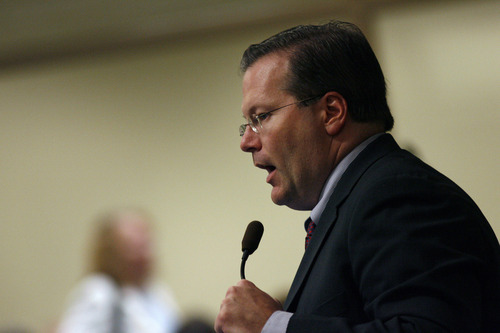This is an archived article that was published on sltrib.com in 2011, and information in the article may be outdated. It is provided only for personal research purposes and may not be reprinted.
The recent move to exempt text messages from Utah's open-records law is shining light on a practice state legislators use to communicate privately on their handheld devices known as pinning.
Exclusive to BlackBerry and BlackBerry-enabled smartphones, the system also referred to as PIN-to-PIN communications lets users send messages directly from one device to another via a wireless network, without the exchange passing through a relay server or creating a copy that might later be retrieved and scrutinized.
The technology, which uses unique personal identification numbers, or PINs, assigned to each BlackBerry, has become a frequently used form of messaging among technically inclined lawmakers on Capitol Hill, affording them a level of privacy not available through email or standard texting, said several legislators and lobbyists on Tuesday.
"The impression has been text messages were public record but PINs were not," said one leading lobbyist, who, as many others, would only speak on condition of anonymity for fear of damaging his standing with lawmakers. Others said lobbyists sometimes taught less tech-saavy lawmakers how to use PINs.
Legislators who want them can get a BlackBerry at state expense, making it a common tool in political circles, but its use has faded from favor in recent years as power brokers and legislative staffers migrate to newer handheld devices such as the iPhone and Android, which lack PIN-to-PIN capabilities.
In this way, advancing technology and the pressure to upgrade has gradually pushed users away from a previously hidden channel of communication and into the open.
"Anytime a friend goes to a non-BlackBerry device, I'm like, 'Oh man, is that private stuff now going to be on the front page of the newspaper?' " said Sen. Stephen Urquhart, R-St. George, who is among the Legislature's more avid technology users. "It's not like anybody's trying to hide anything. It's just that some things are in the public interest and some are not."
Urquhart, an attorney who says he "texts tons" but PINs infrequently, is among eight representatives and senators appointed to a 25-member working group assigned this week to begin reviewing HB477, the controversial overhaul of Utah's government-records laws.
The measure would, among other things, exempt text messages, instant messages and video chats from public disclosure, while also raising fees for accessing government information and eliminating a presumption that such records should be public unless officials show there is a reason to conceal them.
Gov. Gary Herbert has called a special session for Friday to repeal the bill, saying its rapid passage in the final days of the 2011 session had eroded public confidence in government.
A majority of the House Republican caucus, which originally supported HB477, now supports repeal. Senate leaders, though, have resisted immediate repeal.
Urquhart and others said that during the past three years or so, communicating via PINs developed as one of several practices used by legislators to separate private and public conversations, along with carrying different phones for personal and legislative use. Many text and PIN fans on Capitol Hill said they employed these short-format forms of messaging more for quick, logistical exchanges or offhand remarks, rather than substantial policy debates.
"This is a part-time Legislature, and I'm a full-time human being," Urquhart said in an interview. "There needs to be an acknowledgement that there are informal interactions between human beings that are part of life. Nobody is trying hide policy stuff, but rather, this is stuff that's my business."
But, for some, the practice highlights basic differences among lawmakers on the need for privacy.
"If it's owned by the taxpayer, which my BlackBerry is, then everything that goes over this device should be open to the public," said Sen. Pat Jones, D-Holladay, who is also on the HB477 working group. "If you're wasting time trying to protect how you communicate, don't use that device. Use your personal device, or go to a face-to-face conversation."



